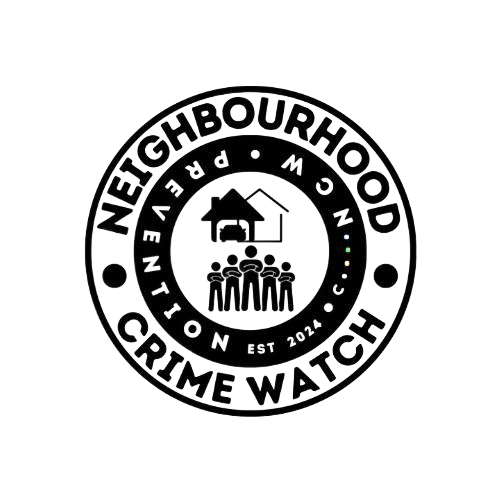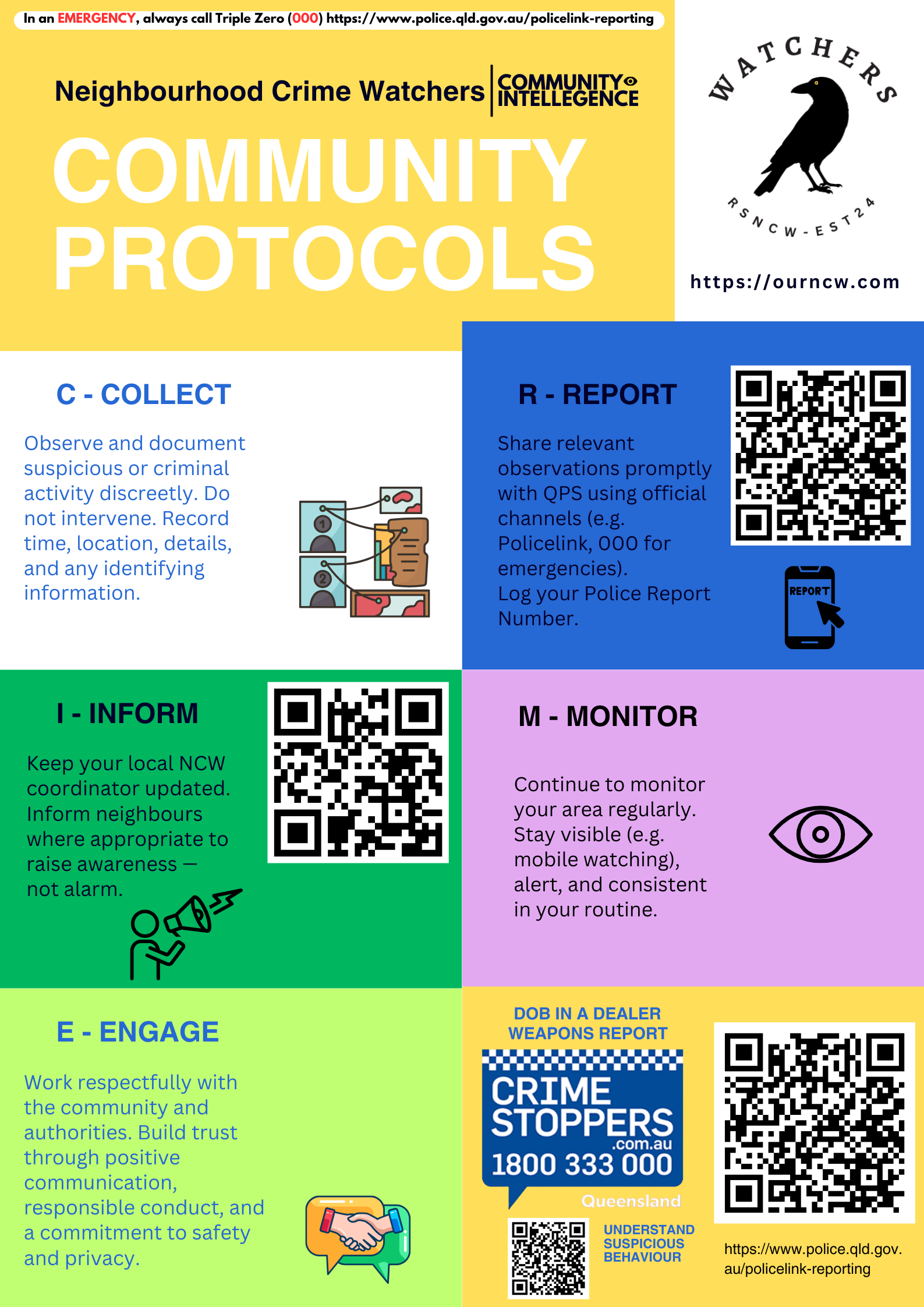your Watchtower
REPORT Community Intelligence
REPORT Community Intelligence
REPORT Community Intelligence
While the NCW network aims to enhance safety through community intelligence by being present, it adheres strictly to civilian privacy laws. This means some reports/locations and information may be unsuitable for sharing.
As incidents arise, submitted photos and footage are regularly updated, providing valuable resources for residents and law enforcement alike reminding offenders, that the NCW.
Thank you for contacting the NCW and for your contribution in building Community Intel.
What now?
Well, we will confirm we have recieved your information. The information you provide will be taken to the executive team for review. This process ensures that we have all relevent information to escalate and safe to share with the community.
Contact with you may be required if we need more infromation regarding your case. If you indicated that you didnt wish to be contacted, this request will be honoured.
Thank you
Regards
Your NCW intelligence Team
REPORTING PROCESS
Step 1: Police Report Logged
- When a resident reports to Policelink or Crime Stoppers, the matter is officially entered into the Queensland Police Service (QPS) system.
- QP reference number is issued. The incident is allocated to the appropriate station or investigating officer. Police then determine whether further action, patrols, or investigation is required.
- REPORT TO QPS HERE.
Step 2: NCW Verification & Integrity Intake
- Once the same report is sent to Neighbourhood Crime Watchers (NCW), the report is verified (checking QP number, timeframe, and suburb).
- NCW ensures that no sensitive or ongoing investigative information is publicly shared.
The report is then classified (e.g., Suspicious Activity, Theft, Vehicle Offence, etc.) and assigned a unique NCW reference number.
Step 3: Community Intelligence Assessment
- The NCW Community Intelligence Unit (CIU) reviews the report to identify the following.
- Hotspot locations or repeat-offence patterns.
- Vehicle or offender descriptions matching other reports.
- Whether CCTV, witnesses, or neighbouring residents may assist Police.
- If necessary, NCWs Criminal Investigation Unit, may issue a Watcher BOLO (Be On the Lookout) to verified Watchers in the area.
Step 4: Local Watcher Coordination
- Watchers or residents registered under Neighbour-Net may be notified if their cameras cover the time/location of interest.
- Residents are invited to review their footage and provide evidence directly to Police or via NCW’s secure referral channel.
All community responses are handled within QPS privacy and evidence-handling standards. The NCW does not breach these laws.
Step 5: Follow-Up & Reporting
- NCW records the event outcome (if information is previewed) once Police confirm action or closure. Trends are logged in NCW’s internal data systems for mapping and quarterly reports.
- Any public community alerts are carefully written to inform, not alarm.
- Neighbourhood Crime Watchers Community locators Logan, Queensland, Australia
- Springwood Neighbourhood Crime Watchers Springwood, Queensland, Australia
- Rochedale South Neighbourhood Crime Watchers Rochedale South, Queensland, Australia
- Rochedale Neighbourhood Crime Watchers Rochedale, Queensland, Australia
- Underwood Neighbourhood Crime Watchers Underwood, Queensland, Australia
- Springwood Police Station 3440 Pacific Highway, Springwood Queensland 4127, Australia
what Protocols
LOOKS LIKE

What happens when you add your report?
Step 1: Police Report Logged
When a resident reports to Policelink or Crime Stoppers, the matter is officially entered into the Queensland Police Service (QPS) system.
A QP reference number is issued.
The incident is allocated to the appropriate station or investigating officer.
Police then determine whether further action, patrols, or investigation is required.
REPORT TO QPS HERE.
Step 2: NCW Verification & Integrity Intake
Once the same report is sent to Neighbourhood Crime Watchers (NCW):
The report is verified (checking QP number, timeframe, and suburb).
NCW ensures that no sensitive or ongoing investigative information is publicly shared.
The report is classified (e.g., Suspicious Activity, Theft, Vehicle Offence, etc.) and assigned a unique NCW reference number.
Step 3: Community Intelligence Assessment
The NCW Community Intelligence Unit (CIU) reviews the report to identify:
Hotspot locations or repeat-offence patterns
Vehicle or offender descriptions matching other reports
Whether CCTV, witnesses, or neighbouring residents may assist Police
If necessary, the CIU may issue a Watcher BOLO (Be On the Lookout) to verified Watchers in the area.
Step 4: Local Watcher Coordination
Watchers or residents registered under Neighbour-Net may be notified if their cameras cover the time/location of interest.
Residents are invited to review their footage and provide evidence directly to Police or via NCW’s secure referral channel.
All community responses are handled within QPS privacy and evidence-handling standards.
Step 5: Follow-Up & Reporting
NCW records the event outcome (if information is previewed) once Police confirm action or closure. Trends are logged in NCW’s internal data systems for mapping and quarterly reports.
Any public community alerts are carefully written to inform, not alarm, and always reference:
If you have information for police, contact Policelink online or call 131 444. Report crime information anonymously via Crime Stoppers on 1800 333 000.”
The
NCW protocols

IMPORTANT
Please note that reporting community intelligence to the NCW does not equate to notifying Police. You are responsible for reporting and must make separate, individual reports to ensure law enforcement is promptly informed.
The NCW serves as a vital resource for sharing crime trends and fostering a safer community. Your proactive participation matters.
https://www.police.qld.gov.au/policelink-reporting
If you have information for police, contact Policelink by providing information using the online suspicious activity form 24hrs per day at www.police.qld.gov.au/reporting or call 131 444.
Report crime information anonymously via Crime Stoppers. Call 1800 333 000 or report online at
www.crimestoppersqld.com.au
